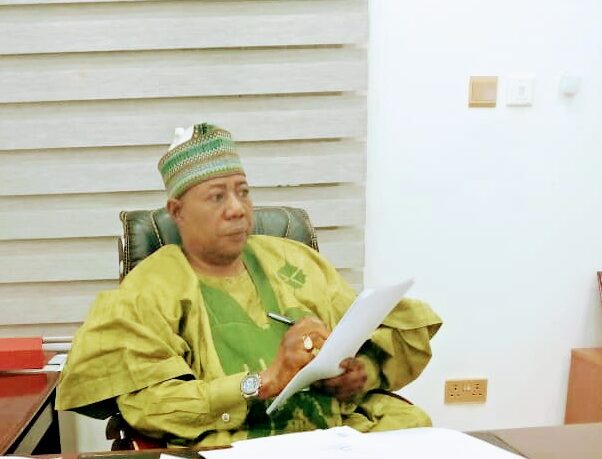The recent announcement by the Renewed Hope Government led by President Bola Ahmed Tinubu that the federal government intends to takeover the payment of salary of state civil servants captures the very essence of “government of the people, by the people and for the people.”
The spirit behind the move is to ensure the push and pull that has trailed minimum wage is settle once and for all. This presidential midas touch is a powerful idea whose time has come.
Needless to emphasise that the move represents the apex of a people-centred approach to governance. It reinforces at once the reality of President Tinubu’s status as pro-people and a people-first government.
More so, this is plausible against the backdrop of the hues and cries that have characterised the steady and smooth payment of minimum wage across, where only very few governors are willing to pay minimum wage without stress. As explained, the presidency has said the initiative will free up resources for the governors to concentrate on other aspects of development.
Nevertheless, there are issues and questions to be asked while contemplating this noble idea. First, if the federal government takes over responsibility for state civil service, won’t it negate the Nigerian federalism? If this idea sails through, what becomes of the fate of local governments that have been ‘recklessnessly’ tied to the apron strings of state governments? Another question that begs for answer is: has the probity and accountability questions surrounding the management of federal allocations by governors tackled? Again, is the epileptic payment of salaries to state workers caused by lack of resources, profligacy or unwillingness to give to Ceaser what is due to him?
Besides, any of such moves must take into consideration the fact that Nigeria’s local government system faces a critical challenge. The past two decades have seen a concerning trend of declining autonomy, often attributed to the actions of politicians during the Fourth Republic (1999-present). This erosion of local control threatens to undo the progress made since the pre-1976 reforms, which aimed to empower local governments.
A central contradiction lies within the 1999 Constitution of the Federal Republic of Nigeria. While Section 7(1) guarantees a democratic system of local government, it is subject to Section 8. This creates ambiguity, as Section 8 empowers state governments to oversee local government functions. This lack of clear separation of powers undermines the intended autonomy of local authorities.
This situation necessitates a critical review of the relationship between federal, state and local governments. Strengthening the constitutional framework for local government and ensuring adherence to its principles are crucial steps. Only then can Nigeria’s local governments fulfill their vital role in fostering development and serving the needs of the grassroots communities.
Lest we forget, the original intention of the Murtala/Obasanjo’s regime for embarking on the famous 1976 local government reforms was to, among other things, make local government a full fledge “Third Tier” of government. With federal allocations coming directly to the local government, the local governments were well reflated. Residual jobs like dispensary, market, social works etc were well serviced. Even traditional rulers had a say in the management of local affairs. And that explains why the traditional rulers were able to check abnormal activities or budding security concerns before they become full-blown.
Alas, with the crude subservience of local governments control to state governors mortgaged the vibrancy of the system. Since then, poverty at the local level has escalated. Insecurity moved from just isolated cases to hyper concerns because the traditional institutions that was once the moral gauge of the society were alienated and incapacitated by the removal of constitutionally assigned role.
Worse still, Section 162 (6) of 1999 Constitution established State Joint Local Government Account (SJLGA). Public Administration experts have described this babarism as the worst evil done to Nigeria and Nigerians. Regrettably, most leaders, especially since 1999, have not exhibited enough commitment to making things work. They have exploited the weakness of the constitution to sit on local government funds through the use of SJLGA.
The structure of federal allocations currently stands at the federal government 52.68%, while state governors collect (States & LGA) 47.32%. This percentage is humongus. The question to ask is: is the development at the states and local governments commensurate with what is been allocated to it?
As commendable as President Tinubu’s initiative to takeover state civil service is, there is need for a proper framework to ensure this doesn’t become another piped dream. This caution becomes necessary because while a good number of governors are claiming not to able to pay salaries, others, even some non-Oil states like Borno state, are comfortably able to pay salaries, gratuity and other benefits. In fact, recently, Governor Babagana Umar Zulum announced that his administration has completed payment of the N12 billion pension and gratuity he inherited. Question is, how is he able to accomplish so much?
The agitation of state governors against the full implementation of Nigerian Financial Intelligence Unit (NFIU) guidelines for ensuring that local councils get their allocations directly from the federation accounts speaks volume. It would be recalled that in 2019, the immediate administration of President Muhammadu Buhari had excised NFIU from the Economic and Financial Crimes Commission (EFCC). Following Buhari’s directive, NFIU had set June 1, 2019 as the take-off date of the new order, making it compulsory for all local government allocations to go straight to their respective bank accounts.
However, the governors opposed this vehemently and threatened fire and brimstone. To add salt to injury is the establishment of State Independent Electoral Commissions (SIECs) which is provided for in the 1999 Constitution of the Federal Republic of Nigeria. Section 197(1) states: “There shall be established for each State of the Federation, the State Independent Electoral Commission whose composition and power are as set out in”.
Since 1999 when this law came into operation, democracy at the local government levels (grassroots) has been nothing more than mockery. SIEC’s have continued to embarrass democracy. Except for the Federal Capital Territory, where opposition parties win some seats, state governors ensure the governing party win 100/100 of seats.
Taking steps to ensure harmony in the administration of wages and salaries is plausible. However, it is far way too infinitesimal to solve the overwhelming or underlining issue of accountability in governance. It calls for a far reaching constitutional reforms to ensure that the the three tiers of government function optimally. The current pitiable state of local government administration calls for worry.
Though it would be a herculean task to change or amend any part of the constitution that is favourable to the governors, President Tinubu must bite this bullet at once. He should initiate an executive bill that seeks to among other things amend Section 162 (6) of 1999 Constitution, which established State Joint Local Government Account (SJLGA).
Suffice to remind the president that when former President Buhari created NFIU and gave it marching orders in 2019, the then chairman of Nigeria Governors Forum, Abdulaziz Yari, in a protest letter to Buhari, claimed that the NFIU’s attempt at ensuring local governments get their allocations directly violates Section 162 of the 1999 constitution.
This instance left Buhari with no choice than to push for the amendment of local governments joint account and the removal of the local government from the control of state assemblies because majority of them are rubber stamp.
Additionally, SIEC has done more damage to democracy at the grassroots level than anything else. Hence, it has outlived its usefulness.
It is high time Nigerians supported local governments and pushed for financial stability for the third tier of government directly. Despite the judgment of the Supreme Court that elected chairman should hand over to elected chairman, nothing has changed. Most of the local governments are still being controlled by caretaker committees appointed by the governors. There is a penalty for any state that violates the verdict if the country’s apex court.
Just recently, I visited some local government areas across the country and examined some council sectariats. The council headquarters looked deserted and have been overgrown by weeds. What this means is that the councils are not functioning and all the finances that the Renewed Hope administration allocates to states for the local governments will mistakenly be missing along the road.
Most of the local governments officials I interacted with said instead of the debates on state police to curb out insecurity across the country, the president should beam the searchlight on local government allocations and ensure that the funds are used judiciously and elected state governors who misappropriate the funds must be made to face the penalty in line with the Supreme Court pronouncement.
There should be stiff penalty for tinkering with council funds. President Tinubu should create a presidential intelligence committee (PIC ) through the office of the National Security Adviser and the Attorney General of the Federation to monitor the implementation of the country’s laws as it is done in most advanced countries where the government at the centre monitors local government funds and ensure that local government allocations are used judiciously.
Our resources should not be squandered on state police when our local government structures that are supposed to address security challenges at the grassroots are decaying. The reality is that security begins at the local governments areas which are capable of curtailing any form of insecurity that arises within a short period of time.
As I conclude, let me reitrate that before a tree starts drying from the leaf, something must have happened to its roots. Against this backdrop, the fight against insecurity and rural poverty will remain a mirage until democracy starts striving at the grassroots level. President Tinubu should do all he can to empower our local government and our communities where 70 percent of population lives. This, I believe, the president will do without delay.



